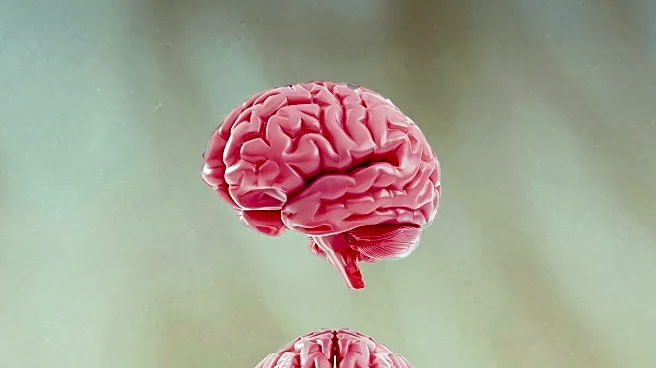What's Happening?
A new study from Weill Cornell Medicine has found that hypertension can cause brain damage even before blood pressure levels rise. The research indicates that hypertension affects blood vessels, neurons,
and white matter in the brain, leading to early gene expression changes that may precede cognitive decline. This discovery highlights hypertension as a major risk factor for cognitive disorders such as vascular cognitive impairment and Alzheimer's disease. The study suggests that medications targeting both blood pressure and brain health could offer new treatment avenues.
Why It's Important?
Hypertension is a prevalent condition affecting nearly half of Americans, and its impact on brain health is more significant than previously understood. The findings underscore the importance of managing hypertension not only to prevent cardiovascular issues but also to protect cognitive function. This research could lead to the development of new treatments that address both blood pressure and brain health, potentially reducing the incidence of cognitive disorders associated with hypertension. Understanding the cellular and molecular effects of hypertension on the brain may also provide insights into preventing neurodegeneration.
What's Next?
The study opens the door for further research into the mechanisms by which hypertension affects brain health. Researchers are exploring the potential of antihypertensive drugs, such as angiotensin receptor inhibitors, to reverse early brain damage caused by hypertension. Clinical trials may be conducted to test the efficacy of these drugs in preventing cognitive decline. Additionally, public health initiatives could focus on raising awareness about the cognitive risks associated with hypertension and promoting strategies for early detection and management.
Beyond the Headlines
The implications of this study extend beyond individual health, highlighting the need for healthcare systems to integrate cognitive assessments into hypertension management protocols. The research also raises ethical considerations regarding the use of genetic and molecular data in developing personalized treatment plans. As the understanding of hypertension's impact on brain health evolves, it will be important to address these ethical issues and ensure equitable access to new treatments.










![Cortisol vs. Melatonin: The Biological War Happening Inside Every Night-Shift Worker]](https://glance-mob.glance-cdn.com/public/cardpress/binge-magazine-card-generation/spaces/US/en/discover-daily/images/ppid_7byehtbd-image-177082393426031154.webp)